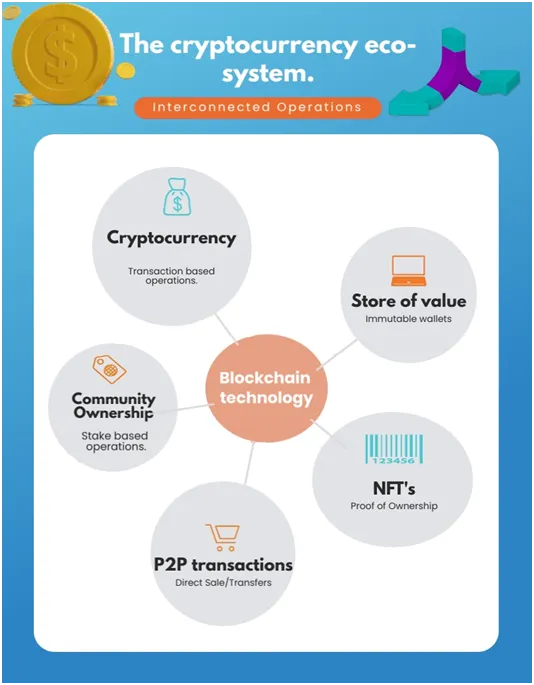
Cryptocurrency: What is it?.
Welcome to my new series on cryptocurrency.
What they are, what they do and how to get involved.
This post will be first in a longer series of informative guides and information related to cryptocurrencies, blockchain and all interconnected areas.
It is written with the perspective of helping people that know very little about this area and is intended as a help and a guide rather than financial advice or for people with an in depth knowledge of the area already.
Introduction to cryptocurrencies.
I have five years experience in the cryptocurrency world and a degree in "Business for Blockchain," but I am not an expert by any means and all content is subject to change.
What i would love would be to get your engagement with the content if you have anything to add to the discussion or even disagree with anything written in these posts. Let me know in the comments section and I will be happy to discuss or even change them if I have gotten anything wrong. This should be a learning experience for everybody reading and hopefully for myself as well. Between us we have more to offer and can learn together.
Going forward I will follow the outline below over the course of the year and try to put together a solid resource that can be shared, discussed and added to moving forward.
Roadmap for the series.
- Introduction.
- What is cryptocurrency?
- Blockchain technology.
- Different cryptocurrency platforms.
- How to get started.
- Security.
- Wallets.
- Effort, investment or trading.
- Portfolio trackers.
Overview of the cryptocurrency space.
- What is distributed ledger technology?
- Proof of work.
- Proof of stake.
- Smart contracts.
- Trading.
- Exchanges.
- Market limits.
- Buy/sell orders.
- Stop loss orders.
Decentralized Finance.
- Staking tokens.
- Liquidity pools.
- Token swaps.
- Content creation.
- Writing content.
- Creating visual content.
- Create to earn platforms.
- Nft’s- Non fungible tokens.
- Non-fungible tokens.
- Tokenization.
- Proof of ownership.
- Artwork.
- Gaming.
- Play to earn concept.
- In game economies.
- Nft’s.
- Investment opportunities.
- Gig economy.
- Be your own business.
- Find opportunities in the crypto space.
- Create a new business.
- DAO funding.
- Summary of the series.
- Beginners lesson in the cryptocurrency space.
- Building a portfolio.
- Moving forward.

Today's topic: Learning more about cryptocurrency.
In this introduction post we are going to look at the following topics and try to gain a better understanding of each area.
- What is cryptocurrency?
- Blockchain Technology.
- The different cryptocurrencies.
These few topics will give us a better understanding of how the eco-system operates and how we can engage with the different aspects of it going forward.
Knowledge is the key to success and knowing what this is all about will help us to form thoughts and opinions going forward to the more practical post in future.
Part 1: What is Cryptocurrency?
If I was to define it,
Cryptocurrency is a peer to peer digital currency. It can be bought, sold or traded online with a value determined by the open market.
The infrastructure of each cryptocurrency is maintained by the users who run the systems needed to operate each blockchain.
Bitcoin is the first successful version of the technology to gain widespread adoption and has grown in value since then as an alternative source of electronic currency to the traditional financial system.
It is the blockchain technology which records all of these transactions in it's coding to be checked off against a decentralized ledger for accuracy and updated figures.
Since Bitcoin has burst onto the scene and grown in value and popularity we have seen cryptocurrencies evolve at a rapid pace.
On October 31, 2008, Satoshi Nakamoto had a vision to share with the world — a protocol he called “bitcoin, a new electronic cash system that's fully peer-to-peer, with no trusted third party.”
While at one stage that vision was the only use for cryptocurrencies. Times have changed.
They are now used as measurement of value for all types of projects and industries.
You can currently go to an exchange and buy a "crypto" attached to any number of innovative projects.
- In-game currencies.
- Property shares.
- Art ownership.
- Rewards for using a platform.
- Permissions for using a service.
- Voting privilege's on platforms.
- Share of profits.
Among many, many others.
If it has a price, then it can be tokenized and traded.
The possibilities are endless for crypto adoption in the future and we are only seeing the start of it.
The common thread here being that crypto is a way to put a price on anything and be able to trade it electronically and instantly which has some obvious advantages over existing systems.
Part 2: Blockchain Technology.
What is blockchain technology and why is it relevant to cryptocurrencies?
Blockchain is a system of recording information in a way that makes it difficult or impossible to change, hack, or cheat the system. A blockchain is essentially a digital ledger of transactions that is duplicated and distributed across the entire network of computer systems on the blockchain.
Ref: Euromoney.
It was mentioned in the previous section that blockchain technology underpins everything that is built in the crypto world.
While cryptocurrencies are a big part of the blockchain world, they are just one use of this technology. In reality the uses cases for blockchain technology stretch across multiple sectors like supply chain, banking, farming, retail ect...
It's important to understand that crypto is just one specific use for these distributed ledgers or blockchains due to their suitability for the technology. Much as the internet is suitable for hosting websites but it also allows for other uses across communication, storage, banking ect...
Crypto is the use case but blockchain is the underlying technology that makes it work. It's very suited to this as blockchain technology is designed to be resistant to hacking or manipulation by using multiple ledgers distributed across the internet and verify the information independently meaning any manipulation on one ledger can be easily flagged against all other ledgers.
We however don't need to know how the internet works to use it just like we don't need to understand the ledger system to be a part of it but it is good to know that it exists.
We are not just playing with magical internet money as some would call it.
Part 3: The different cryptocurrencies.
Currently there are over 18,000 known cryptocurrencies and probably a lot more unknown crypto's that have little support.
Before getting involved with any cryptocurrency or making trades it is always important to "Do your own research."
The majority of these tokens will not have any value in ten years and a lot will not even last that long. This is an emerging space and has a lot of people trying to create bold new ideas.
Similar to how the dot com bubble had a lot of failures, there were a few exceptions that rose to the top and became very successful. The key was being invested in the right projects.
This is where research comes into play and picking the right cryptocurrency to get involved with is vital.
How do you look at 18,000 tokens and pick the right ones which will survive?
Markets are volatile and the landscape changes regularly. Then with regulations yet to catch up to the markets it has a long way to go before we see some real stability.
The first question to ask before getting started is, "What is your plan?"
Do you plan on being a buyer, trader, collector, earner or what purpose will crypto have in relation to your life?
What do you want it for?
This will play a big part in choosing where to go next as you can probably guess that with 18,000 choices there is a wide range of options and use cases.
Then there is the level of risk that you want to assume with your choices. You can pick a stable or high ranking token with low returns but much safer prospects or get involved in low market cap projects as an early adopter for high returns but high risk of failure or worse.
Personally there are a few key indicators that I look for before purchasing a token or buying into a project.
- The project team.
- Use case for the token.
- The community.
- Social activity.
- Track record of delivering targets.
Investing in crypto is the same as investing in any stocks or business where the track records count.
If the team has failed multiple times before then why would they succeed this time?
If there is no reason for the token to exist then why would anybody buy it?
If there is no community to support the project then how will it grow?
There is lots of information out there related to any cryptocurrency but for quick and easy statistics you can check out sites like Coingecko that have the main points there for each token.
Most people have heard of Bitcoin, Ethereum, Ripple, Dogecoin but how many of them know what they do?
How many know what the purpose if for the token at #162 in the rankings?
A small bit of research goes a long way and knowing what you want to get out of your portfolio helps to narrow down those choices.
Over time it's good to learn about a mixture of tokens across investing, gaming, finance, staking and build a portfolio but for new users the simplest options are usually the best.
Stick to the top marketcap coins and build from there.

Summary
This post is an overview of the crypto space at a glance more than anything else.
Future posts in this series will be a little more detailed and specific to the topics listed above but I hope that people will find this helpful for how to get started and look at the resources provided for more information.
Here are just some of the factors that I would base a decision on but it's all about looking beyond they hype to the reality of the project.
Step 1: Make a plan for what you want to do.
Step 2: Do your own research.
Step 3: Make your choices.
Step 4: Learn how to get involved with the token.
Step 5: Secure those funds in a good wallet.
The next article will look in more detail at wallets, portfolio's, security and starting to build your portfolio.
The cryptoverse is a huge area full of new ideas and projects that can be a bit overwhelming at first glance.
Taking the time to find a good entry point and build up knowledge and value slowly over time is a safe way to build wealth.
Over the course of this series I hope that I can help others to do this safely and productively.
More resources:
Crypto-guides - A guide to bitcoin
Niallon11 - Getting rich slowly.
Taskmaster4450 - Technology is accelerating

